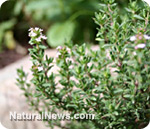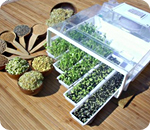|
Thyme has remarkable antiviral, bactericidal, fungicidal, antibiotic, diuretic, antispasmodic, expectorant, and antiseptic properties that make it wonderful to have around during cold and flu season. In addition to killing microbes, thyme helps the body to eliminate toxins and boosts the immune system by supporting the formation of white blood cells, increasing resistance to invading organisms. Its familiar, warm, herbaceous aroma is powerful and penetrating, and the origin of its name, which comes from the Greek word 'thymos' meaning 'to perfume.' The history of thymeThyme has a long and fascinating history. Used by all the early civilizations of the Mediterranean as a medicinal plant, both Hippocrates and Dioscorides described its uses in their writings. The ancient Egyptians used it for embalming. The ancient Greeks burned it as an incense in their temples and used it in their baths for courage. The Romans brought the herb to Europe, and used it to purify their rooms and give 'aromatic flavor' to cheese and liqueurs. In the Middle Ages, thyme was placed in bedrooms to ward off nightmares, given to knights for courage, taken into courtrooms to ward off diseases, and used at funerals to assure safe passage to the afterlife. Before modern antibiotics, thyme was used to medicate bandages.Thyme is an easy to grown perennial shrub that can tolerate hot, sunny places well. It has long been used as a culinary herb. It delays the putrefaction of meat, a very useful trait in warm climates before refrigeration. Studies in modern times have verified this use with tests that prove adding essential oil of thyme slowed the proliferation of bacteria, preserving the food for an additional three days. Ingesting thyme also stimulates the digestive system and serves as an intestinal antiseptic. Health benefits throughout thymeOther traditional uses of thyme include the treatment of respiratory infections. An excellent pulmonary disinfectant, thyme is useful against flus, colds, sore throats, asthma, catarrh, coughs, laryngitis, whooping cough, and bronchitis. Inhale for nose, throat, and chest infections; for mouth and gum infections (such as thrush, gingivitis), use in toothpaste or mouthwash/gargle. As little as a .1 percent solution is effective. After a study in Germany, many researchers believe the effectiveness of cough medicines is due to the exhalation (after swallowing) of the local action of the essential oil on the respiratory tract. Extensive research has shown the effectiveness of essential oils, including thyme, as expectorants and to increase mucus secretions to relieve dry coughs. Inhalation in small amounts worked best; too strong has the opposite effect. Inhaled treatments are especially effective when treating chronic infections that linger in the sinuses.Thyme is used as a remedy for physical and psychological weakness, and still is today. Useful for regaining strength after illness, chronic fatigue, or depression it can also be used to help insomnia as its effects are balancing. It stimulates circulation, aids concentration, raises blood pressure that is too low, and has even been thought to increase intelligence and memory. It revives, strengthens, and balances both mind and body. The essential oil of thyme is antibacterial, acting on the bacteria's enzymes. As such, it has been used in soapy solutions for disinfecting hands before surgery, being a stronger antiseptic than most used in hospitals. Thyme can destroy staphylococcus at a dilution of 1,000 times. A study in France showed thyme to be among several essential oils that were found to destroy 90 percent of microbes within three hours, when used in a vaporizer. It deodorized the air and purified it from proteus, staphylococcus, streptococcus, and cryptococcal. Additional uses include: • Thyme is useful on infections of the urinary tract and bladder, and also acts as a diuretic, increasing its effectiveness • Also use for candida and vaginitis • Use to kill nail fungus • Thyme is an ingredient in natural hand sanitizers • Add thyme to a hot compress to relieve rheumatic pain, muscular aches and pains, sprains, sports injuries, sciatica, arthritis, gout • Crush the fresh herb or use diluted oil as first aid on insect bites and stings • Use on athlete's foot. For this use, you can apply the oil neat, or undiluted, but protect the skin with some fatty cream. Other neat applications include animal bites and boils. • Use a one percent solution as an antibacterial wash for fresh produce • Use in hair and skin care regimes, as a hair tonic or in a face wash and for treatment of things like acne or warts • Use thyme in a sitz bath or massage to stimulate menstruation for weak or missing periods • Use to kill parasites • Thymol, a chemical constituent in thyme essential oil, has been found to increase blood-flow to the skin, thought to speed healing • Thymol has been found to protect and increase the percentage of healthy fats found in cell membranes • Dietary consumption of thyme has been shown to increase the amount of DHA (docosahexaenoic acid, an omega-3 fatty acid) in brain, kidney, and heart cell membranes • Thyme will discourage insects from invading your home • Use thyme with rosemary, lavender, and cedarwood in a mixture of grapeseed and jojoba carrier oils to treat alopecia areata. According to the double-blind controlled clinical trial, massage the mixture into the scalp daily for several months. • Because of the risk of irritation, it is a good idea to use thyme in blends. It blends particularly well with bergamot, grapefruit, lemon, lavender, rosemary and pine. Contraindications and considerations for useIt is not recommended to use thyme essential oil in its pure, concentrated form directly on the skin as it can be irritating to sensitive skin. The stronger oils, used in concentrated form could cause sensitization to the immune system or stimulate the thyroid gland and lymphatic system. Do not use if pregnant, but useful during labor to move along 'failure to progress' and expel afterbirth. Avoid in the presence of high blood pressure or epilepsy. If you have cancer, liver damage, or other serious health conditions, use under the guidance of a qualified practitioner.A conservative but effective way to use essential oil of thyme is to massage it into the soles of the feet. This method is typically well tolerated, reaching the lower bronchial capillaries, then through the circulatory system, the whole body, all without being absorbed into the liver. It is also very effective to inhale thyme, using a few drops on a tissue or handkerchief, or putting in an aroma burner or vaporizer/humidifier. Sources for this article include: Davis, Patricia. Aromatherapy: An A-Z. Barnes and Noble Books, New York 1995. P. 313-315. Fischer-Rizzi, Susanne. Complete Aromatherapy Handbook. Sterling Publishing Co, New York 1990. p. 212-213. Worwood, Valerie Ann. The Complete Book of Essential Oils & Aromatherapy. New World Library, San Rafael, CA, 1991. P. 21-22. http://en.wikipedia.org/wiki/Thyme http://www.naturalnews.com/030814_rosemary_herbs.html |



















 Ma
Ma SPROUTS A good article by a fellow Chiropractor
SPROUTS A good article by a fellow Chiropractor





